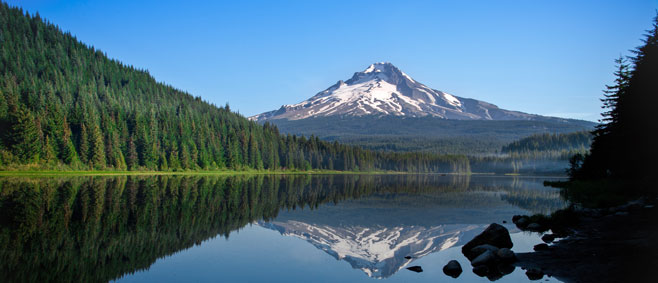Environmental economics and policy
A world where economic insights drive environmental transformation is a world where you can help reduce the impact of human behavior on environmental problems and the misuse of natural resources. Cultivate the skills needed to change behaviors, influence policy and steward our natural resources toward a better future by earning your environmental economics and policy bachelor’s degree online from Oregon State University.
Delivered by Oregon State’s renowned Department of Applied Economics, this program will help you become an expert at identifying solutions to pollution, climate change, deforestation, overfishing and other environmental issues. Explore your passions — whether in the biological, physical or social sciences — while building strong economic and data analysis skills. Dive deep into the socioeconomic dimensions of environmental issues as you blend scientific understanding with innovative policy design.
Skills you’ll gain in OSU’s online environmental economics and policy degree program
As a student in Oregon State’s online environmental economics and policy degree program, you’ll gain the in-demand skills you need to stand out in the job market and level up your career. You’ll learn from expert Oregon State faculty who have real-world industry experience.
- Applied economics
- Natural resource economics and policy
- Measuring resource and environmental impacts
- Microeconomics
- Macroeconomics
- Environmental law
- Benefit-cost analysis
Program details
The online coursework in the environmental economics and policy bachelor’s program will teach you how to harness the tools of economics and data analysis to tackle humanity's most pressing challenges. You’ll build expertise in statistical and economic methods and learn how to apply that knowledge toward environmental policy.
The online environmental economics and policy program is offered by Oregon State’s College of Agricultural Sciences.
Degree requirements
A minimum of 180 quarter credits — at least 60 of which must be upper-division credits — are required to graduate with your degree in environmental sciences, including:
- OSU’s Core Education
- Major requirements: Environmental economics and policy

Additional program features
Transfer credits
Some degree requirements may be transferred from other institutions. Please note that a minimum of 45 credits of the last 75 credits in this degree program must be completed at Oregon State (online or on campus) to meet the academic residency requirement.
Previously earned credits must be reviewed upon admittance to OSU for appropriate articulation. Additional information about transferring credits is available through OSU’s Transfer Credit Central.
Pursue an honors degree online
As an undergraduate degree-seeking student, you can apply to earn an honors degree online in your academic major. Earning this prestigious degree gives you the opportunity to collaborate with faculty on research, complete a comprehensive thesis experience and engage in co-curricular activities.
Explore certificates and microcredentials
You can gain highly specialized skills that are in demand by employers — and do it with less of a time and financial commitment — when you earn a certificate or microcredential online with Oregon State. Choose from a large collection of short-form offerings that can help you upskill quickly.
Environmental economics careers
The knowledge you acquire in Oregon State’s online environmental economics and policy degree program will help you fill in-demand jobs in the global marketplace. As a leader in this area, you’ll enter the workforce ready to provide insights in economic sectors that need environmental economics experts.
Job market outlook
Use the interactive tool on this page to discover employment trends, top occupations and salary details for professionals who have skills related to environmental economics and policy. Please be aware that completing a program related to the job market information shown here does not guarantee employment or a specific salary.
Request
information
To ensure that you receive emails from us, please add "ecampus@oregonstate.edu" and these domains to your safe senders list: “@oregonstate.edu,” “@discover.oregonstate.edu” and “@email.oregonstate.edu.”
† All mobile information you share will remain confidential and will never be given to external sources. Any costs associated with receiving a text message are the responsibility of the individual receiving the message. Opting in to this mobile text messaging service from Ecampus is free of charge, however, message and data rates may apply from your wireless carrier.
Contact
Our enrollment services team can help answer questions about online learning at Oregon State Ecampus and how to get started.
8 a.m-4 p.m. PT Monday-Friday
Contact Ecampus or book an appointment
To ensure that you receive emails from us, please add "ecampus@oregonstate.edu" and these domains to your safe senders list: “@oregonstate.edu,” “@discover.oregonstate.edu” and “@email.oregonstate.edu.”
Book an appointment
Program specific questions
Get answers to your questions about pursuing an online environmental economics and policy degree.
Contact the program lead
Connect with Jeff Reimer, professor and head of the Department of Applied Economics, at jeff.reimer@oregonstate.edu.





